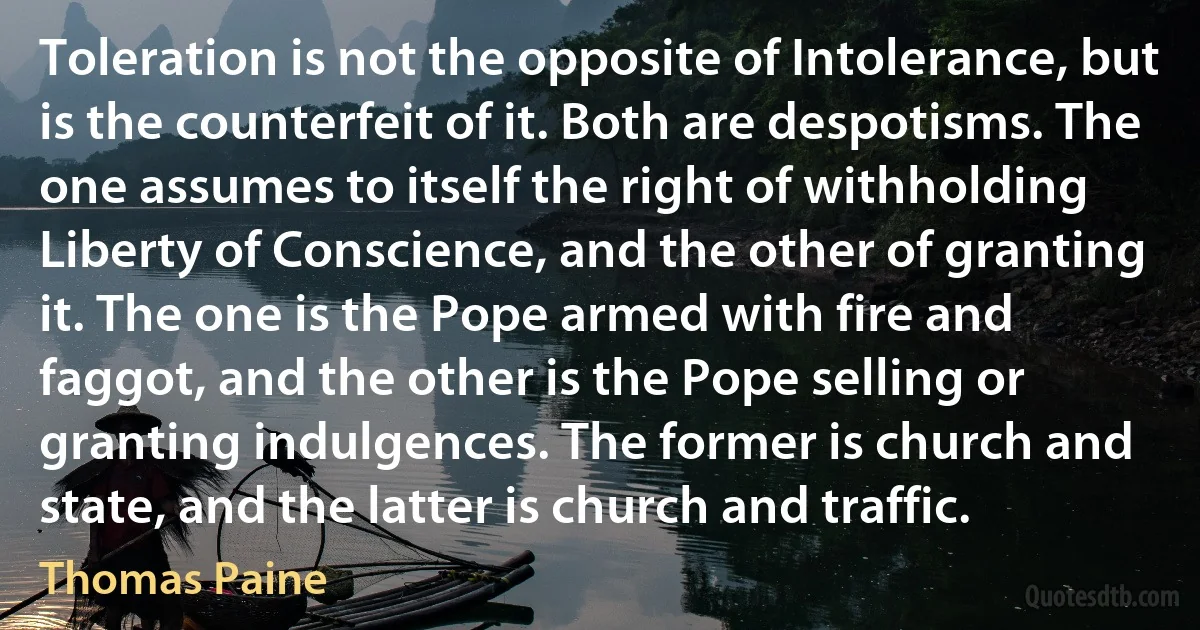Latter Quotes - page 29
The native Jewish families in Jerusalem, as well as those in other parts of Palestine, present a marked difference to the Jews of Europe and America. They possess the same physical characteristics - the dark, oblong eye, the prominent nose, the strongly-marked cheek and jaw - but in the latter, these traits have become harsh and coarse.

Bayard Taylor
Colonial system, public debts, heavy taxes, protection, commercial wars, etc., these offshoots of the period of manufacture swell to gigantic proportions during the period of infancy of large-scale industry. The birth of the latter is celebrated by a vast, Hero-like slaughter of the innocents.

Karl Marx
The Individual living in this unity has a moral "life; possesses a value that consists in this substantiality alone. Sophocles in his Antigone, says, "The divine commands are not of yesterday, nor of to-day; no, they have an infinite existence, and no one could say whence they came." The laws of morality are not accidental, but are the essentially Rational. It is the very object of the State that what is essential in the practical activity of men, and in their dispositions, should be duly recognized; that it should have a manifest existence, and maintain its position. It is the absolute interest of Reason that this moral Whole should exist; and herein lies the justification and merit of heroes who have founded states, however rude these may have been. In the history of the World, only those peoples can come under our notice which form a state. For it must be understood that this latter is the realization of Freedom, i.e. of the absolute final aim, and that it exists for its own sake.

Georg Wilhelm Friedrich Hegel
By the conversion of the ten kingdoms to the Roman religion, the Pope only enlarged his spiritual dominion, but did not yet rise up as a horn of the Beast. It was his temporal dominion which made him one of the horns: and this dominion he acquired in the latter half of the eighth century, by subduing three of the former horns as above.

Isaac Newton
It is wise not to confuse information and inspiration. The former is the result of studious application, the latter is what happens when you don't think about it.
Each has a role to play, but must not look to play the role of the other. Inspiration may be the bright tower in the clouds; information is the solid rock where the foundations are.

John Howe (artist)
The World Game is a precisely defined design science process for arriving at economic, technological and social insights pertinent to humanity's future involvement aboard our planet Earth. The processes consist of mathematical procedures not only as incisive and complex as those involved in celestial navigation, or astro-ballistics, or the space program, but even more so-for, in addition to all the variables common to those sciences and The World Game, the latter involves also all the variables governing the planning of the programs of the industrialization of both Russia and China....The World Game is seven times more complex than China's quarter century industrialization and thirty-five times more complex than was Russia's industrialization problem. The World Game must find the specific means of making five billion humans a total economic and physical success at the earliest possible moment without anyone being advantaged at the expense of another.

Buckminster Fuller
He thought that he had now established an influence over Herr Hitler, and that the latter trusted him and was willing to work with him. If this was so, it was a wonderful opportunity to put an end to the horrible nightmare of the present armament race. That seemed to him to be the big thing in the present issue.

Neville Chamberlain
The poor people, it is true, have been much less successful than the great. They have seldom found either leisure or opportunity to form a union and exert their strength; ignorant as they were of arts and letters, they have seldom been able to frame and support a regular opposition. This, however, has been known by the great to be the temper of mankind; and they have accordingly labored, in all ages, to wrest from the populace, as they are contemptuously called, the knowledge of their rights and wrongs, and the power to assert the former or redress the latter. I say RIGHTS, for such they have, undoubtedly, antecedent to all earthly government, - Rights, that cannot be repealed or restrained by human laws - Rights, derived from the great Legislator of the universe.

John Adams
Liberty, according to my metaphysics, is an intellectual quality; an attribute that belongs not to fate nor chance. Neither possesses it, neither is capable of it. There is nothing moral or immoral in the idea of it. The definition of it is a self-determining power in an intellectual agent. It implies thought and choice and power; it can elect between objects, indifferent in point of morality, neither morally good nor morally evil. If the substance in which this quality, attribute, adjective, call it what you will, exists, has a moral sense, a conscience, a moral faculty; if it can distinguish between moral good and moral evil, and has power to choose the former and refuse the latter, it can, if it will, choose the evil and reject the good, as we see in experience it very often does.

John Adams
I was brought up from my earliest youth to believe in the enormous importance of peace. I have often heard my father, the late Lord Salisbury, say that, though he did not see how it was possible under the then existing circumstances to avoid wars altogether, yet he had never been able to satisfy himself that they were in principle morally defensible.
Indeed, particularly in the latter part of his life, he made more than one speech in which he expressed the hope that, by some international combination, wars could in the future be prevented. He did not hesitate to express his belief that some such organization as we have since then attempted and erected in the League of Nations might furnish the solution of what he conceived to be the terrific evil of war.

Robert Cecil, 1st Viscount Cecil of Chelwood
History has repeatedly illustrated the dire consequences of extreme social inequality. It foments revolutionary ferment, which can come from the left or the right. Either a leftwing populism that smashes oligarchic power takes control or its counterfeit, a rightwing populism, built on the poisoned solidarity of hate, racism, vengeance and violence - and bankrolled by the hated oligarchs that use it as a front to solidify tyranny. We are barreling towards the latter.

Chris Hedges
Always judge your fellow passengers to be the opposite of what they strive to appear to be.
For instance, a military man is not quarrelsome, for no man doubts his courage; but a snob is.
A clergyman is not over strait- laced, for his piety is not questioned; but a cheat is.
A lawyer is not apt to be argumentative; but an actor is.
A woman that is all smiles and graces is a vixen at heart : snakes fascinate.
A stranger that is obsequious and over-civil without apparent cause is treacherous: cats that purr are apt to bite and scratch.
Pride is one thing, assumption is another; the latter must always get the cold shoulder, for whoever shews it is no gentleman: men never affect to be what they are, but what they are not. The only man who really is what he appears to be is - a gentleman.

Thomas Chandler Haliburton
The other dangers are from Socialism and Fascism. The menace of the latter is not an obvious one, but it is a very real one. You just look at the newspapers which practically created the present Government. You listen to the whispers that are going on-the admiration for Fascism, for its leadership, for its policy, the sort of hint that this is the way, that Signor Mussolini has shown the path for us here, not by concessions, not by giving way to the working classes, but by force-in the words of Signor Mussolini, "The people are tired of liberty." Are they? If they are, then God help them, and their children will live to regret it. There is nothing which is worth selling your freedom for.

David Lloyd George

![Accounts of outrages committed by mobs form the every-day news of the times. They have pervaded the country from New England to Louisiana, they are neither peculiar to the eternal snows of the former nor the burning suns of the latter; they are not the creature of climate, neither are they confined to the slaveholding or the non-slaveholding States. Alike they spring up among the pleasure-hunting masters of Southern slaves, and the order-loving citizens of the land of steady habits. Whatever then their cause may be, it is common to the whole country. [...] Such are the effects of mob law, and such are the scenes becoming more and more frequent in this land so lately famed for love of law and order, and the stories of which have even now grown too familiar to attract anything more than an idle remark. But you are perhaps ready to ask, "What has this to do with the perpetuation of our political institutions?" I answer, "It has much to do with it." (Abraham Lincoln)](https://cdn.quotesdtb.com/img/quotes_images_webp/91/abraham-lincoln-answer-anything-531691.webp)

